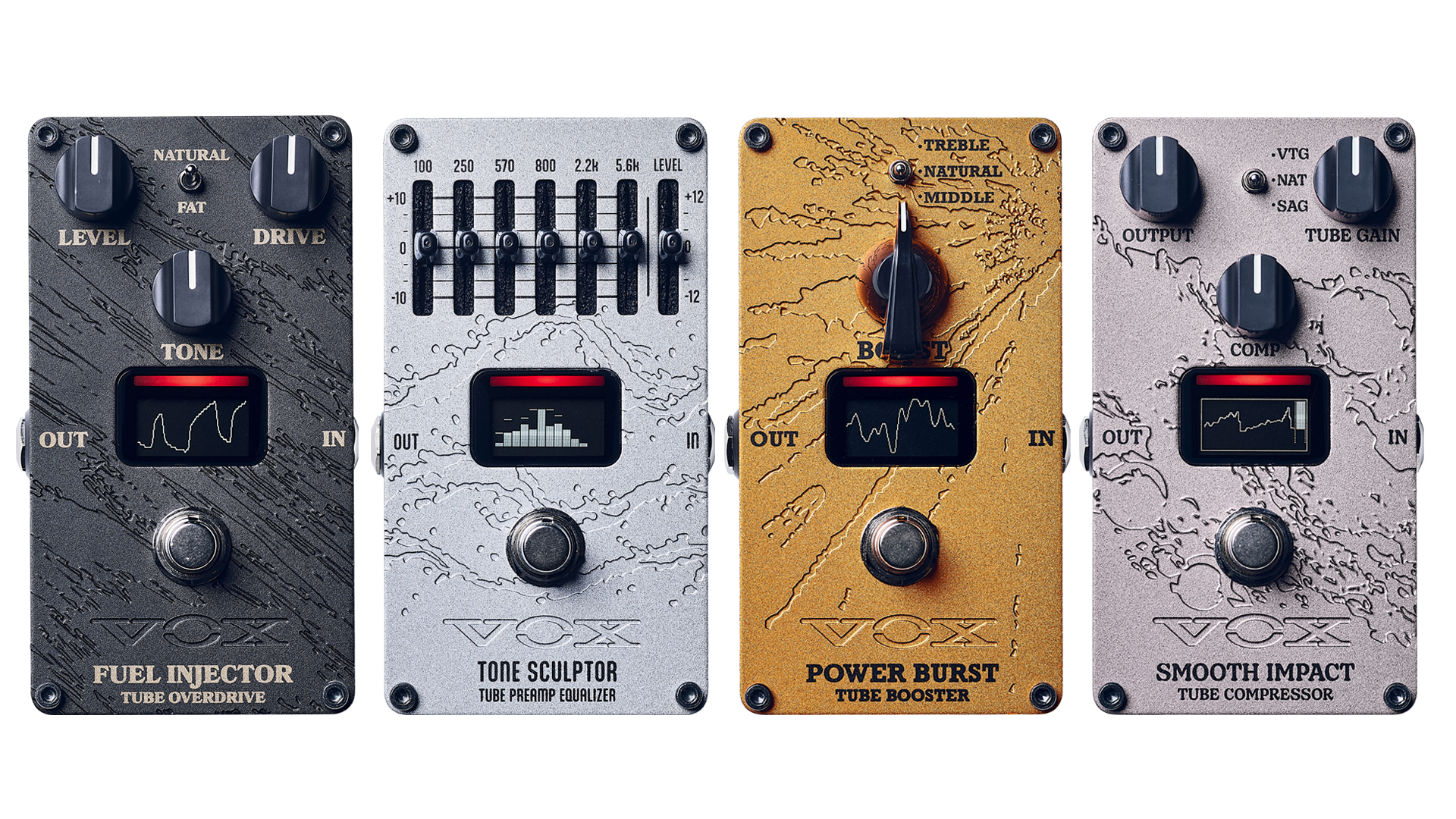GuitarPlayer Verdict
These four pedals make convincing tube tone courtesy of Nutube technology. As a plus, each carries a 1/8-inch jack for linking two pedals to automatically turn one off when you turn the other on, thereby minimizing toe tapping.
Pros
- +
See each review
Cons
- -
See each review
You can trust Guitar Player.
The notion of rich, warm tube tone still looms large in guitarists’ imaginations. So much so that some manufacturers are still making strides to capture an authentic rendition of that technology in a smaller and less power-hungry form for use in compact circuits, even while so many others are embracing the digital technology that ably imitates such tones without a tube in sight.
By adding these four new Valvenergy Series 2 pedals to the four that already exist in Series 1, Vox is further embracing the Nutube technology invented by Korg several years ago, which has also been used in a series of Vox mini-amps under the Nutube banner.
Invented and patented by Korg, the Nutube, according to its maker, is “similar to a conventional vacuum tube, has an anode grid filament structure, and operates exactly as a triode vacuum tube. Also similar to a vacuum tube, it creates the same characteristic rich overtones.”
It’s worth noting up front, however, that you can’t replace existing dual-triode preamp tubes, such as the common 12AX7, with a Nutube. And while a Nutube uses far less power and produces less heat, it also produces significantly less gain. All that aside, it purportedly presents a clever means of achieving tubey richness and compression in circuits designed to employ it.
Pedals in this Series 2 selection include the Power Burst, Fuel Injector, Tone Sculptor, and Smooth Impact, listing at $199.99 for the first two and $219.99 for the second two. All are housed in a rugged aluminum box measuring 4.5 by 2.5 by 1.5 inches, the top of which displays a color and etched design unique to each model. Controls are unique to each pedal, but every one carries a small oscilloscope front and center that displays the circuit’s effect on the waveform as you play, as well as the pedal’s on/off status. Also common to all is the inclusion of space for a nine-volt battery inside, with Vox’s recommendation that you use an adaptor (not included) when possible due to the pedals’ considerable power consumption. The latter means that a minimum 600mA supply is required.
Vox also tells us that a buffered bypass is engaged when the pedal is switched off, as required for the Nutube to function smoothly in these circuits. Each pedal has side-mounted jacks for input and output, plus a nifty Link feature on a 1/8-inch jack at the front that can link two pedals to automatically turn one off when you turn the other on, thereby minimizing the toe tapping. This feature arguably made more sense with the Series 1 pedals, which were all amp-in-a-box style, enabling faux channel switching, but might still be handy to instantly turn off the Power Burst booster while turning on the Fuel Injector overdrive, for example.
I tested each of these with a Fender Telecaster and a Gibson ES-355 into a tweed Deluxe-style 1x12 combo and a 65amps London head and 2x12 cab.
All the latest guitar news, interviews, lessons, reviews, deals and more, direct to your inbox!
Fuel Injector Tube Overdrive
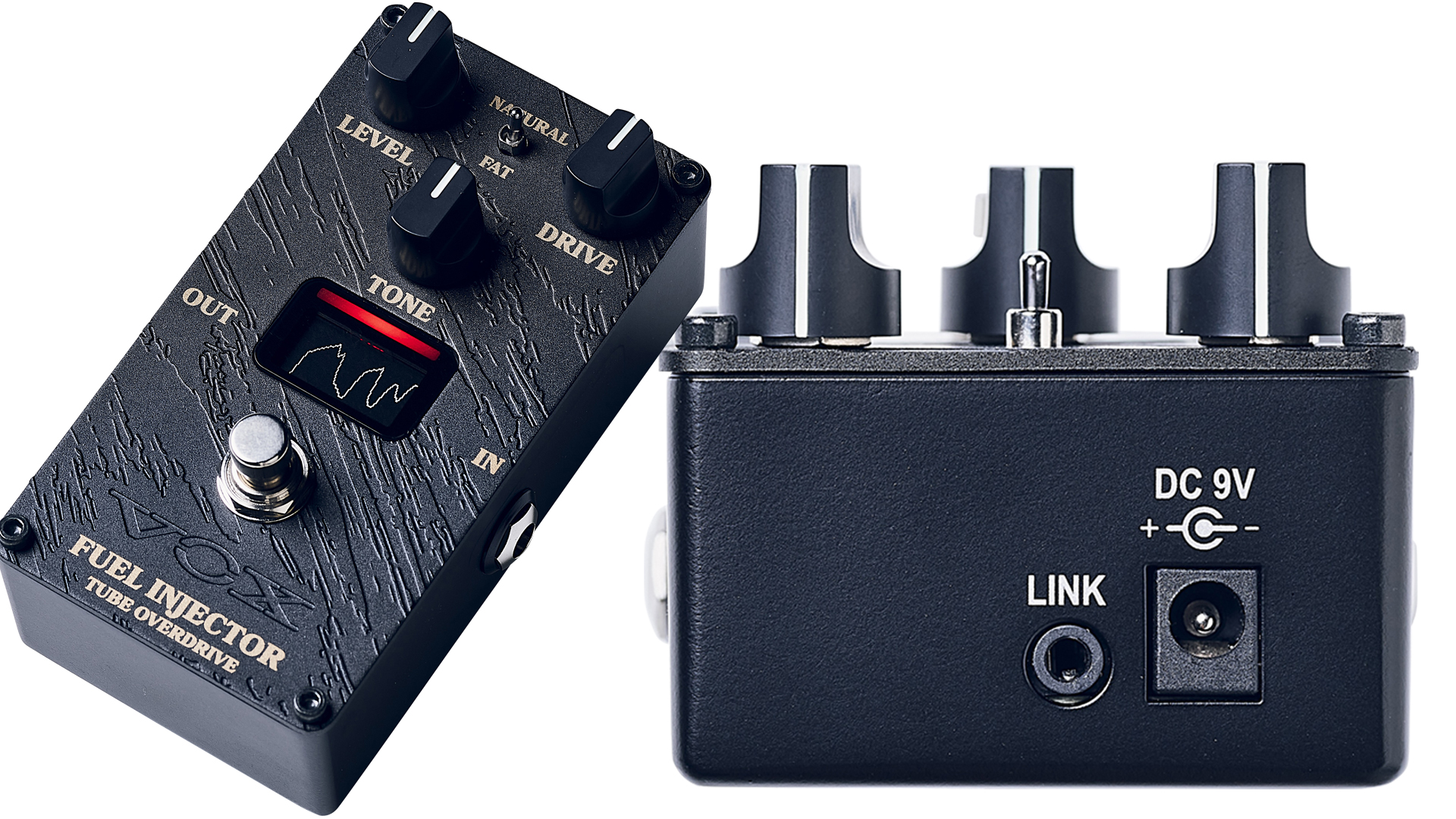
In addition to the shared features, the Fuel Injector carries knobs for drive, tone and level, plus a two-way mini-toggle for Natural or Fat mode, the latter position inducing a thicker voice that Vox proposes is particularly useful with single-coil pickups.
In use, this OD largely exhibits its own flavor rather than aping any of the classics of yore, while its oscilloscope displays the circuit’s impact on the overtone spectrum as you play. Within the Fuel Injector’s unique character I found good note-to-note clarity, which avoids getting muddy in power chords, along with some raspy bark and aggression at the core and a little fizz at the edge of the note that hints toward old-school ’70s distortions. There’s a pretty good range of gain-induced flavors from the drive knob, from mild overdrive (yet still with this pedal’s own personality) up toward a more distortion-leaning overdrive. The Natural/Fat voicing switch is effective, and I like that it doesn’t tip into being too boomy in the latter position, but adds just enough grunt to thicken up thinner-sounding guitars.
Fuel Injector Tube Overdrive
CONTACT voxamps.org
PRICE $199.99 street
CONTROLS Drive, Tone, Level, Natural/Fat voicing switch
EXTRAS Input and output, buffered-bypass switching, oscilloscope, center-negative 9V DC input (600mA minimum required)
SIZE 4.5"x2.5"x1.5"
ASSEMBLED IN Vietnam
KUDOS An original overdrive with a distinctively aggressive character when pushed.
CONCERNS Might be a little hard-edged for players seeking smoother TS-style overdrive.
Power Burst Tube Booster
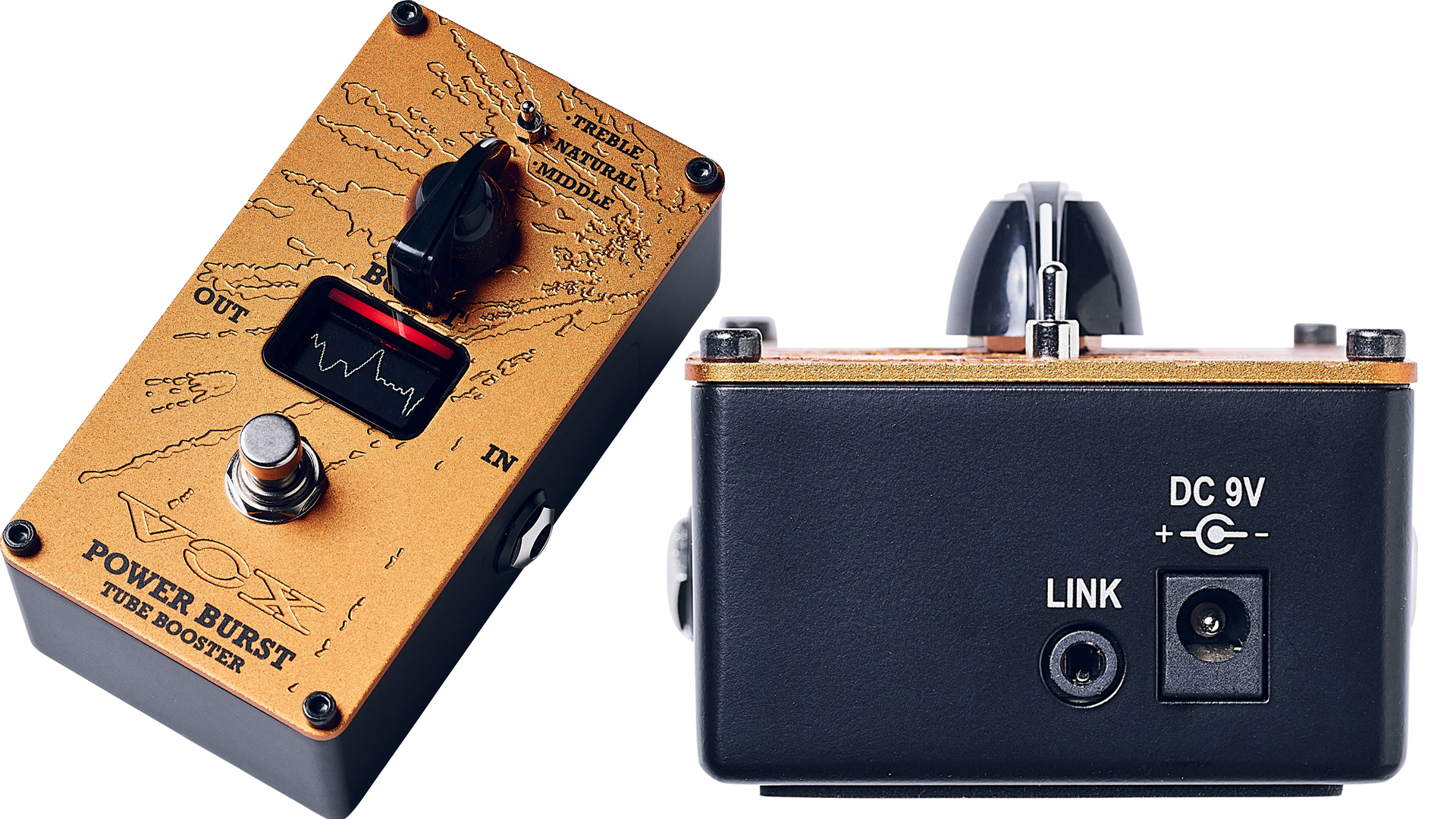
Graced with a single boost knob for gain, plus a three-way mini-toggle for Treble, Natural, or Middle voicing, the Power Burst is a straightforward, yet relatively versatile boost designed to offer a degree of variable coloration to its gain staging. In this one, much like the Fuel Injector, the oscilloscope displays the harmonic complexity added to the sound wave as you play, and particularly as you turn up the boost knob.
While boost pedals can seem a dime a dozen at times, I found this one surprisingly good sounding, with an appealing character that lands somewhere toward the middle of the neutral-to-colored spectrum. The three-way voicing switch adds significant versatility, too, although it might prove something many players would like to switch on the fly depending on the guitar in use.
Arguably the Middle (mid boost) position can sound a little choked with some guitars and amp settings, but it’s handy if you need added grunt from a thin instrument. I really like the fact that the Treble setting adds sparkle to the upper register without emasculating the lower wound strings, and Neutral does much as it says on the box. With the boost knob up much beyond noon the hint of compression at the front — whether from the Nutube or merely the circuit itself — tips the Power Burst into low-gain overdrive territory, but with excellent articulation and less color than most drive petals. All in all, a useful and relatively versatile box for all its simplicity.
Power Burst Tube Booster
CONTACT voxamps.org
PRICE $199.99 street
CONTROLS Boost, Treble/Natural/Middle voicing switch
EXTRAS Input and output, buffered-bypass switching, oscilloscope, center-negative 9V DC input (600mA minimum required)
SIZE 4.5"x2.5"x1.5"
ASSEMBLED IN Vietnam
KUDOS A versatile booster pedal with an appealing character.
CONCERNS Not entirely neutral, if that’s what you’re seeking.
Smooth Impact Tube Compressor
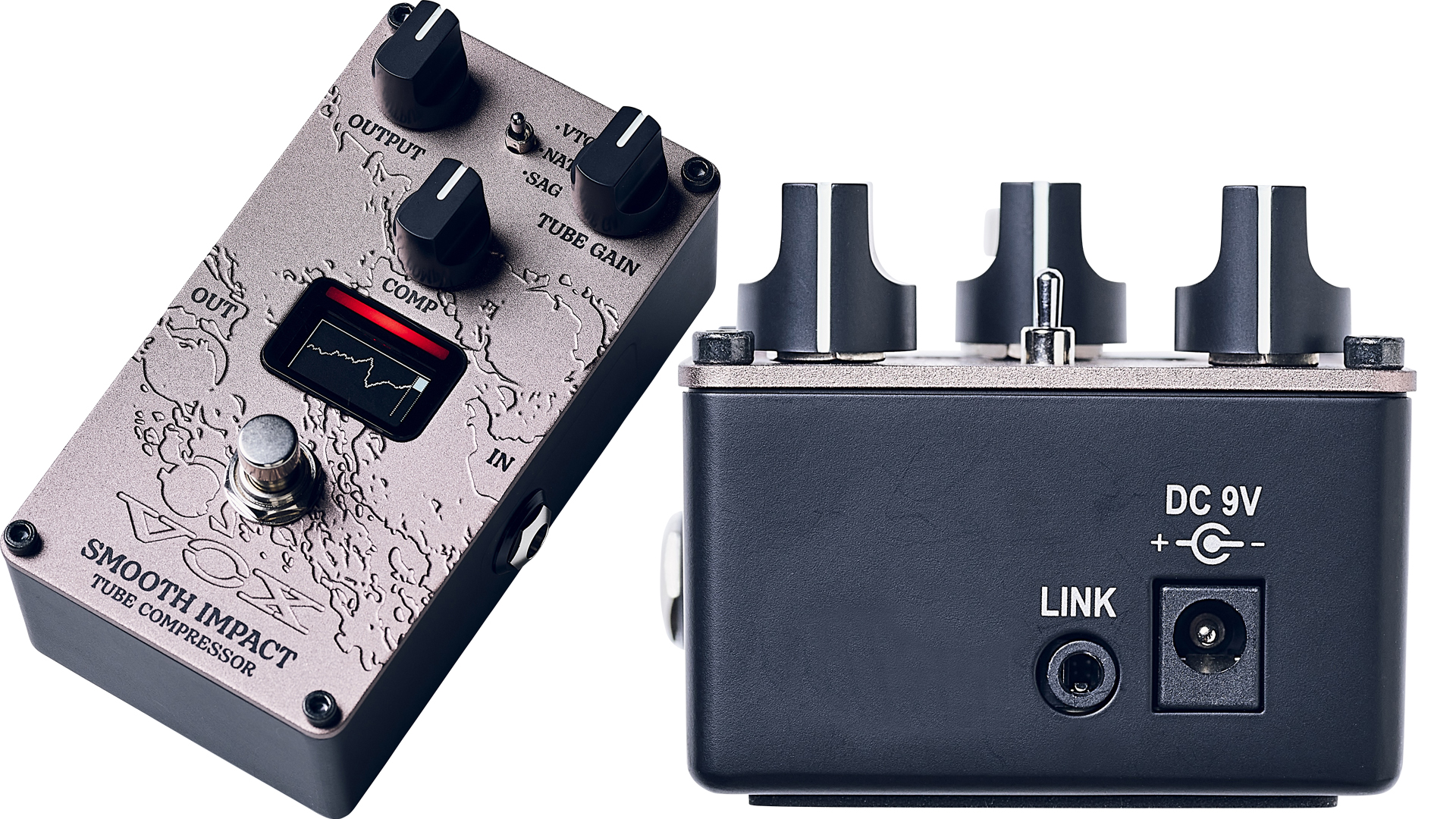
The Nutube-equipped compressor of the bunch carries controls for tube gain, comp and output, with a three-way voicing/feel switch delivering Vintaged, Natural or Sag, plus an oscilloscope that displays its gain reduction upon attack and the speed of ramping up as the note swells.
In use, it’s a good-sounding compressor that simply does the job expected of it, but with appealing, if subtle variation from the three-way switch and the rather nifty added bonus of the tube gain knob to drive it. Generally, the first test of a good compressor is finding out how much you miss it when you turn it off, and indeed I heard a degree of that “blanket over the amp” thing when switching off this one.
With three flavors of comp readily available — subtle, yet distinct variations — and the three-knob versatility, it’s still very easy to use, yet a bit more flexible than some of the simpler compressor pedals out there. On one hand, it’s arguably not as overtly colored or characterful as some of the most-revered units on the market, but it’s a good-sounding rendition that has an appealing personality and does well at this price point.
Smooth Impact Tube Compressor
CONTACT voxamps.org
PRICE $219.99 street
CONTROLS Tube Gain, Comp, Output, three-way Vtg/Nat/Sag switch
EXTRAS Input and output, buffered-bypass switching, oscilloscope, center-negative 9V DC input (600mA minimum required)
SIZE 4.5"x2.5"x1.5"
ASSEMBLED IN Vietnam
KUDOS An effective comp benefitting from three feel/voice modes.
CONCERNS Possibly a touch subtle for those seeking more colored compression.
Tone Sculptor Tube Preamp Equalizer
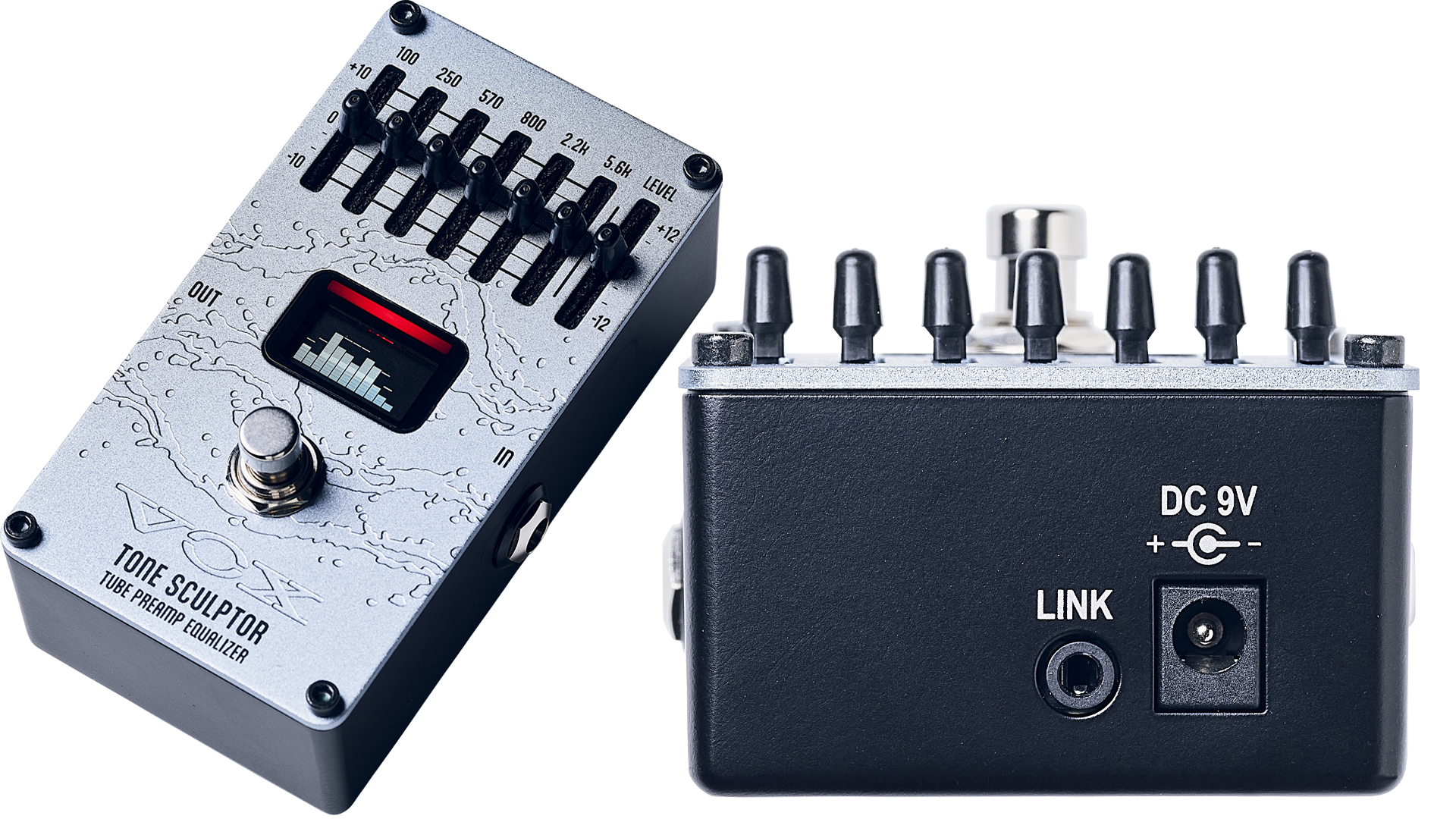
This graphic equalizer features six sliders for frequency-band-dependant boost or cut of +/-10dB at 100Hz, 250Hz, 570Hz, 800Hz, 2.2kHz and 5.6kHz, plus a level slider capable of boosting or cutting by 12dB in either direction. On this one, the oscilloscope presents a graphic display of the relative levels of several frequency bands as you play when switched on.
All in all, it’s a handy and effective EQ, which pretty much does what you would expect from such a pedal. Effective at everything from a scooped smile curve that made the Voxy London head sound more black-panel Fender, to a pushed mid hump with a little level boost to convert the tweed combo into a mini Marshall, it also works well as a simple clean boost, with added frequency-carving flavors to taste. Beyond all this, though, I enjoy the way it adds a little compression to the front of the note while still remaining clear, and maxing out the level slider at 12dB is easily enough to crunch up the front end of your tube amp.
Tone Sculptor Tube Preamp Equalizer
CONTACT voxamps.org
PRICE $219.99 street
CONTROLS EQ sliders for +/-10dB at 100Hz, 250Hz, 570Hz, 800Hz, 2.2kHz and 5.6kHz; Level slider for +/- 12dB
EXTRAS Input and output, buffered-bypass switching, oscilloscope, center-negative 9V DC input (600mA minimum required)
SIZE 4.5"x2.5"x1.5"
ASSEMBLED IN Vietnam
KUDOS A simple but effective EQ, useful for tonal changes or frequency tweaked boost.
CONCERNS Might seem a tad pricey for what it does.
Dave Hunter is a writer and consulting editor for Guitar Player magazine. His prolific output as author includes Fender 75 Years, The Guitar Amp Handbook, The British Amp Invasion, Ultimate Star Guitars, Guitar Effects Pedals, The Guitar Pickup Handbook, The Fender Telecaster and several other titles. Hunter is a former editor of The Guitar Magazine (UK), and a contributor to Vintage Guitar, Premier Guitar, The Connoisseur and other publications. A contributing essayist to the United States Library of Congress National Recording Preservation Board’s Permanent Archive, he lives in Kittery, ME, with his wife and their two children and fronts the bands A Different Engine and The Stereo Field.
